What are the benefits and harms of tomatoes for a woman's body: contraindications and norms for the use of tomatoes
This fruit from the nightshade family is one of the most popular in the world, with an annual harvest of over 60 million tonnes. Sounds intriguing, right? In our article we will focus on the familiar to everyone tomatoes, which, due to their natural qualities, have a positive effect on the female body.
The content of the article
The benefits and harms of tomatoes for a woman's body
There is a strong opinion among the people that tomato is a “male” product, as it is able to increase potency and prevent prostate diseases.
Let's find out how tomatoes affect the female body and whether there is any benefit from their use.
Beneficial features
Tomatoes have become very popular for their nutritional characteristics. Traditional medicine, backed by scientific research, rates tomato as a natural antioxidant that normalizes metabolic processes in the body. Thanks to the vitamins and trace elements it contains, this fruit is beneficial for the digestive and cardiovascular systems.
Eating tomatoes has many health benefits for women, such as:
- Preservation of youth and beauty (improvement of skin color, condition of nails and hair) due to the high content of ascorbic acid.
- Breast Cancer Prevention.
- Prevention of osteoporosis during menopause - occurs with the participation of phytonutrients (sources of antioxidants) contained in tomatoes.
What else are tomatoes good for? The serotonin included in their composition is involved in supporting the work of the pituitary gland and vascular tone, so varicose veins are least of all threatened by women who love tomatoes. Also, serotonin affects the surge of strength and increased mood.
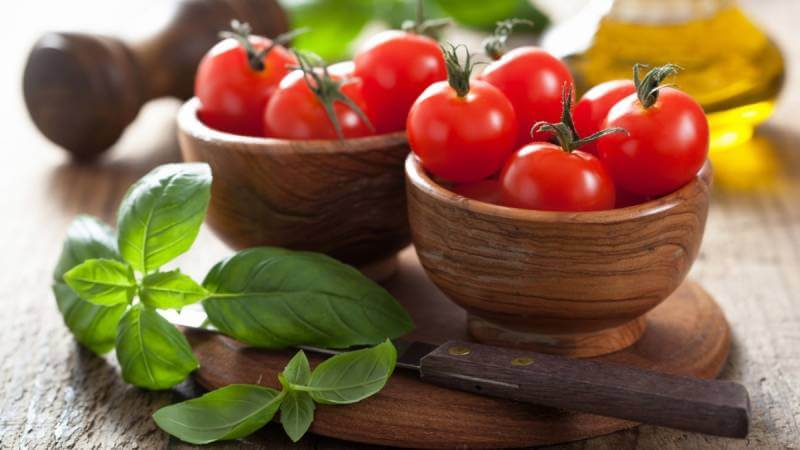
Harm from tomatoes
The question may arise: is it possible for such healthy vegetables as tomatoes to be harmful to health? Imagine this happens and you have to take it seriously.
For a number of diseases, there are contraindications to the use of tomatoes:
- It is categorically impossible to eat them with cholelithiasis and cholelithiasis, since they have a bile-excreting effect and are able to provoke an attack as a result of the movement of stones in the ducts.
- Tomatoes should be used in moderation for people with acidity gastritis and kidney diseases.
- Allergy sufferers also need to be careful with red tomatoes. They contain anthocyanin - a strong allergen that can cause gastrointestinal disorders, skin rashes, swelling of the tongue and mucous membranes in the mouth, up to anaphylactic shock. With yellow varieties of tomatoes, the issue of allergies disappears, since they do not contain anthocyanin.
- In case of dysfunction of the pancreas and gout, it is recommended to exclude tomatoes from the diet.
Caloric content and chemical composition
Tomatoes are low-glycemic foods (10), so they are suitable for fasting days and all kinds of weight loss diets. The calorie content of tomatoes ranges from 18 to 24 kcal (depending on the variety). In 100 g of the product, 92 g is water, 1.1 g is proteins, 1.4 g is fiber, 3.8 g is carbohydrates.
Tomato lovers will rejoice when they discover how rich they are in vitamins, fiber, amino acids, proteins and enzymes. They contain almost all B vitamins (B1, B2, B3, B4, B5, B6, B9), ascorbic acid (in some varieties in large quantities), carotenoids, organic acids, macro- and microelements: magnesium, potassium, phosphorus , calcium, iodine, copper, zinc, fluorine. Mono- and disaccharides are also present in fruits.
100 g of tomato contains:
- beta-carotene - 1 mg;
- riboflavin - 0.04 mg;
- vitamin E - 0.4 mg;
- folic acid - 11 mcg.
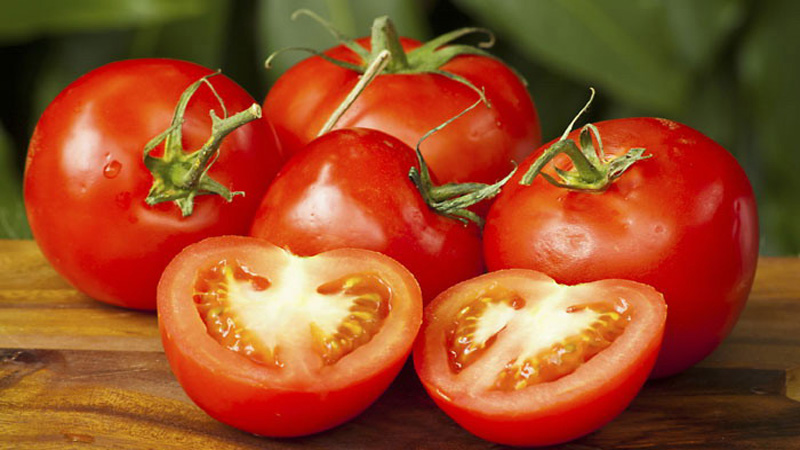
When and how much to consume
The benefits of tomatoes for the female body are priceless. But how many tomatoes do you need to provide it with the necessary components?
According to the WHO recommendation, a person needs up to 400 g of vegetables, berries and fruits per day. If you divide them into five meals, you get 80 g per meal. Therefore, two tomatoes a day is a normal portion of vitamins and minerals, because other healthy vegetables and fruits, rich in fiber, enzymes and minerals, enter the body.
For your information.It is better not to mix tomatoes with proteins and starches and eat them half an hour before the main meal.
In what form is it better to eat
The fruit grown in its natural environment is consumed both fresh and thermally processed or frozen. In any case, it will have a positive effect on health.
Fresh vegetables have more vitamins and minerals, however, according to the latest research by scientists, the antioxidant lycopene is better absorbed when stewing, steaming or boiling tomatoes. In frozen and dried (dried) in fruits, beneficial components are preserved, provided that the fruits are ripe without the use of chemicals.
In terms of vitamin C content, tomato juice is equivalent to orange juice, but like any freshly squeezed juice, it should not be overused. It is recommended to drink no more than two glasses a day.
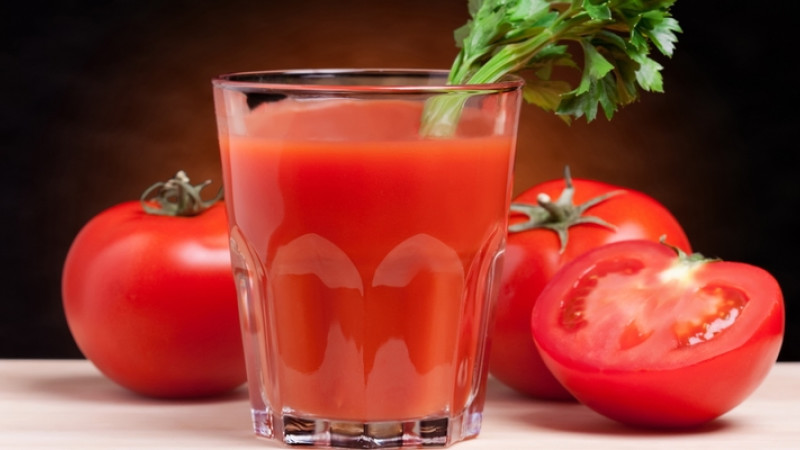
During pregnancy and breastfeeding
During pregnancy, folic acid, potassium, calcium, magnesium, iodine and lycopene, available in tomatoes, provide support for the woman's immunity, prevent anemia and varicose veins, and also participate in the favorable formation of the fetus.
However, there are some nuances here. Tomatoes must be introduced into the diet delicately: in small portions as part of salads with vegetable oil.
From purchased tomato juices, sauces and canned food during pregnancy better to refuse.
There is an opinion that it is better for nursing mothers not to eat red foods. However, this rule is not so categorical for tomatoes. Yes, when breastfeeding tomatoes should be eaten with caution, as this can adversely affect the health of the baby: there is a risk of colic, flatulence, allergies.
Therefore, tomatoes should be introduced into the diet in stages, starting with one quarter. In this case, it is necessary to observe the baby's reaction. If there are no apparent reasons for concern (redness, rashes, diarrhea, nervous irritability and other indicators of allergies), one small tomato per day will be acceptable, because it is a valuable product for normalizing lactation.
It's important to know! Yellow tomatoes are not considered allergens, are well absorbed by the body during pregnancy, have a beneficial effect on cardiac activity and the work of hormones.
The benefits of tomatoes for weight loss
Due to the wide range of useful properties and low calorie content, this product is recommended for those who want to lose weight and do not suffer from diseases for which tomatoes are contraindicated. Organic acids normalize metabolism, lycopene breaks down fat, and chromium dulls the feeling of hunger.
Vitamins E and C help restore skin elasticity and reduce the risk of skin sagging after weight loss. However, frying, sauces, pickled and salted tomatoes are unsuitable for diets, it is better to refuse them.
If every day you drink 300 ml of freshly squeezed unsalted tomato juice (not in packs) 20 minutes before meals, replace fatty and sweet foods with cottage cheese, boiled / baked meat and fresh vegetables and fruits, then it is quite possible to lose from 3 to 6 kg in a month ... Tomato juice is a great substitute for fresh tomatoes (up to five ripe tomatoes a day), but during the day you need to drink 1-1.5 liters of clean water.
Fasting days and diets are best carried out in the summer-autumn period - the season of natural fruit ripening.
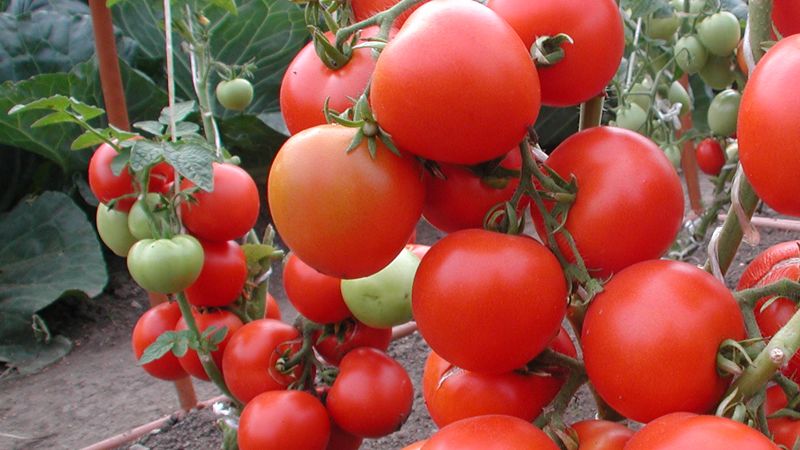
How to choose
How not to be mistaken with the choice of the "right" tomatoes so that they will only benefit the body? Chemical fertilizers are used very often when growing fruits, and harmful substances can be found in any plant product.
If the amount of nitrates in tomatoes does not exceed the permissible norm, they can be eaten, but how to determine this by their appearance? There are several rules:
- If you want to improve your health with tomatoes, it is best to use products straight from the garden during their ripening season. The winter greenhouse vegetable is already a concentrate of chemical fertilizers to accelerate growth.
- White veins in a ripe cut vegetable indicate that it is oversaturated with chemicals.
- To make sure there is a lot of chemistry in the tomato, let it fall on a hard surface. If a juicy tomato remains unharmed when it falls, it means that it contains many chemical additives unnecessary for the body. The "correct" fruit, hitting the surface, will crack and release the juice.
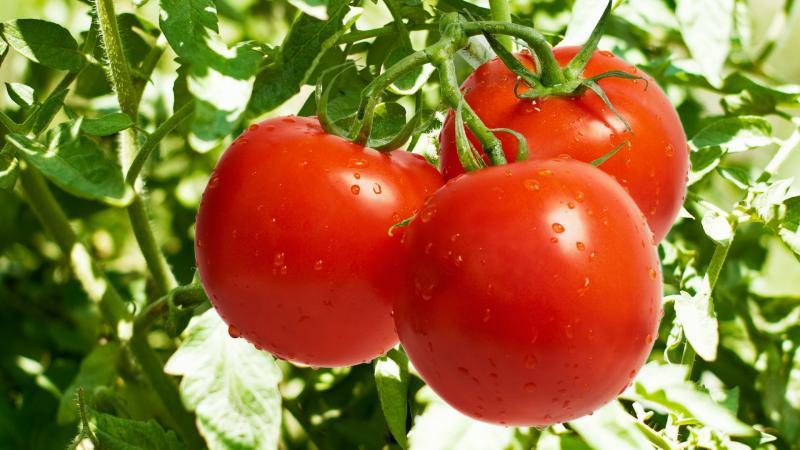
Conclusion
The role of tomatoes in maintaining women's health cannot be underestimated. Their fruits contain almost the entire palette of the vitamin and mineral complex, which is so necessary for a woman at any age.
Unless you have a serious digestive disorder, gout, or allergies, don't neglect these vegetables. Whenever possible, eat tomatoes from your garden or choose ripe and juicy fruits grown naturally without the addition of chemicals and growth enhancers.